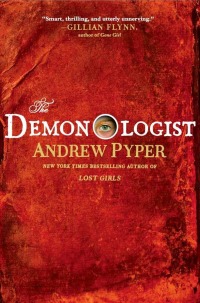
Published by Simon & Schuster on March 5, 2013
Does the world really need another novel about demons and the Vatican? I'm not a big fan of books in which Satan is a character. I am, however, a fan of Andrew Pyper. I loved The Wildfire Season, a thriller with sharply drawn characters that has nothing to do with the supernatural. Based on my admiration of that book, I decided to give The Demonologist a try. It turned out to be a good decision. Yes, the plot involves a demon, but this is fundamentally a book about flawed mortals.
In the novel's first thirty pages, Pyper gives more life to his protagonist than most authors can manage in three hundred. David Ullman is a faculty member in the English Department at Columbia, specializing in mythology and religious narrative with a particular expertise in Milton's Paradise Lost. Ullman suffers from depression, which may be why his wife is openly having an affair with a physics professor. Ullman wants his floundering marriage to work and does his best to be a good husband to Diane, although, like many men, he can't remedy her complaint that he is rarely "present in the moment." His platonic friend, Elaine O'Brien, is Ullman's "clear-thinking inner self" but she has been diagnosed with an advanced stage of cancer. His eleven-year-old daughter, Tess, alienated from both her parents, seems to share his melancholy. David is alone in the world. But does he need to be?
A mysterious woman appears in Ullman's office on behalf of an employer that wants a demonologist to investigate a phenomenon she refuses to describe. The next day David and Tess are off to Venice. What he encounters there rocks the foundations of his belief system. As much as he would like to ignore it, he can't. He is given a task -- to "find and retrieve the dead ... from darkest limbo" -- that his life, and his daughter's, will hinge upon. Whether David will survive may depend upon whether he is "vulnerable to becoming convinced of impossibilities."
Throughout the novel, David is manipulated by unseen forces. He's being chased, but is his pursuer working for the Devil or the church? Or, as O'Brien sees it, has David created his own mythology, a delusional reaction to grief? While The Demonologist has the action and the pace of a thriller, this is also the story of a man reinventing himself. David takes a road trip to North Dakota ("a version of hell in itself") and then south and back north, a journey that advances the plot while giving David time for introspection. It is a journey of self-discovery that forces David to confront the part of himself that refuses to engage with the world. To battle the Devil, David must open his mind to horror. He must remember the past while learning how to think and feel at the same time. He must understand the death of his brother and confront his feelings about his father. The Demonologist is ultimately the story of a very personal hell.
Pyper has mastered the art of building fully shaped characters into plot-driven stories. Not just in its horrific subject matter, but in the intensity of its prose, the realism of its supernatural elements, and the intelligence of the story, Pyper has crafted a chilling tale of good and evil. The Demonologist reminded me of Joe Lansdale at his best. It is a book that will appeal not just to fans of horror, but to all readers who appreciate a thought-provoking story told with literary style.
RECOMMENDED